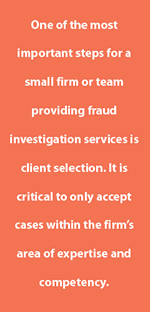Firms of all sizes are interested in expanding their practices to include forensic accounting and fraud investigation. Experts agree: This practice area is growing and will continue to grow for the foreseeable future.
Yet adding forensic accounting to a firm’s portfolio of services might not be as easy as it sounds. While traditional audit staff might have a good foundational knowledge to branch out into fraud investigation, offering reliable service to clients in this area takes a little more work.
Focusing Services
While the decision to provide forensic accounting services may seem simple, the next step is deciding specifically which services to provide. There are many types of matters that may fall under the forensic accounting umbrella, and it is important to develop an appropriate focus.
A firm’s services could be geared toward a variety of fraud-related matters, including corporate embezzlement, financial statement fraud, and insurance claims fraud. The business could alternately be focused on litigation matters like contract disputes, shareholder lawsuits, business valuation, and bankruptcy consulting. There are many more types of cases that could fall under one or both of these headings, so it’s clear that there are a great deal of choices to be made.
A smaller firm (or a small team at a larger firm) will likely have the most success in marketing its services by offering a higher quality of service. This makes it necessary for that group to focus the services and not try to provide any and every type of forensic accounting or fraud investigation service available. It makes more sense to focus resources on developing expertise in a few niche areas and build a solid client base from there.
Performing the Investigation
One of the most important steps for a small firm or team providing fraud investigation services is client selection. It is critical to only accept cases within the firm’s area of expertise and competency. The ability to complete a case within the time frame desired by the client is also essential; missed deadlines can be fatal to a practice.
The process of performing a fraud investigation must be administratively managed just like a traditional tax or auditing engagement. There should be a budget and agreed-upon fees, as well as an engagement letter detailing the project and services to be provided. Internally, the firm or team must assign employees to the engagement and make their roles clear.
Document management is the key to the completion of a thorough and reliable investigation. It is recommended that a database be used to track documents, the dates they are received, who provided them and a brief description of each one. This will make it easier in the event that a particular document needs to be located or identified later.
Small teams and firms can easily falter if they do not properly manage the documents in a fraud investigation. Document management is sometimes neglected on smaller engagements, but this can cause problems when preparing a final report or testifying in court.
Unlike a traditional audit, a fraud investigation or forensic accounting engagement may not rely heavily on work programs. While there may be a general roadmap for a fraud investigation, each project is unique and may not lend itself well to standard procedures.
If a team is performing an engagement with limited use of work programs, it is important that staff is carefully supervised and that more experienced investigators play an active role in the investigation. This personal involvement will be necessary in order to make sure that all critical documents are examined and all necessary evidence gathered.
Small Team Advantages
When performing fraud investigations, the adage “bigger is better” may not be true. There are many advantages that a small team or a small firm can bring to a project. Most important, a smaller group may often have a much better focus on the services provided. A firm or team might decide to develop a specialty in a niche area of fraud consulting or forensic accounting, and this expertise can be valuable to the right client.
Often a smaller team is easier to assess and manage. The client understands that “what you see is what you get,” meaning that the true experts are usually intimately involved in all aspects of a small team’s investigation. There are often fewer issues with supervision of staff, and a smaller team can have better control over documents and evidence.
Quality control over a forensic accounting project is often easier with a smaller team of professionals. The most experienced investigators usually work more closely with the documents, and are therefore more knowledgeable about the evidence and the issues in the case.






